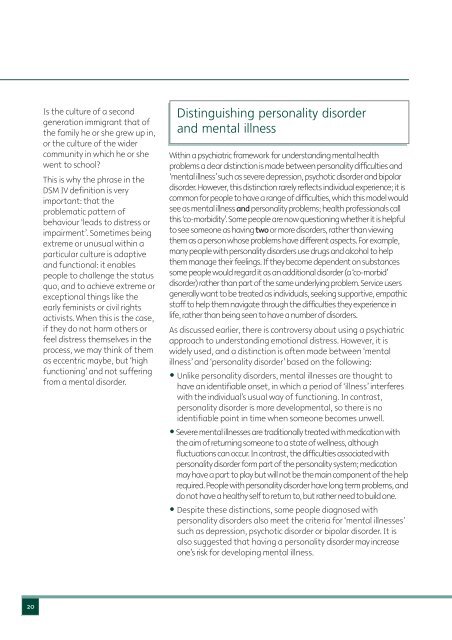Meeting-The-Challenge-Making-a-Difference-Practitioner-Guide
Meeting-The-Challenge-Making-a-Difference-Practitioner-Guide
Meeting-The-Challenge-Making-a-Difference-Practitioner-Guide
Create successful ePaper yourself
Turn your PDF publications into a flip-book with our unique Google optimized e-Paper software.
Is the culture of a second<br />
generation immigrant that of<br />
the family he or she grew up in,<br />
or the culture of the wider<br />
community in which he or she<br />
went to school?<br />
This is why the phrase in the<br />
DSM IV definition is very<br />
important: that the<br />
problematic pattern of<br />
behaviour ‘leads to distress or<br />
impairment’. Sometimes being<br />
extreme or unusual within a<br />
particular culture is adaptive<br />
and functional: it enables<br />
people to challenge the status<br />
quo, and to achieve extreme or<br />
exceptional things like the<br />
early feminists or civil rights<br />
activists. When this is the case,<br />
if they do not harm others or<br />
feel distress themselves in the<br />
process, we may think of them<br />
as eccentric maybe, but ‘high<br />
functioning’ and not suffering<br />
from a mental disorder.<br />
Distinguishing personality disorder<br />
and mental illness<br />
Within a psychiatric framework for understanding mental health<br />
problems a clear distinction is made between personality difficulties and<br />
‘mental illness’such as severe depression,psychotic disorder and bipolar<br />
disorder. However, this distinction rarely reflects individual experience; it is<br />
common for people to have a range of difficulties,which this model would<br />
see as mental illness and personality problems; health professionals call<br />
this ‘co-morbidity’. Some people are now questioning whether it is helpful<br />
to see someone as having two or more disorders,rather than viewing<br />
them as a person whose problems have different aspects. For example,<br />
many people with personality disorders use drugs and alcohol to help<br />
them manage their feelings. If they become dependent on substances<br />
some people would regard it as an additional disorder (a ‘co-morbid’<br />
disorder) rather than part of the same underlying problem. Service users<br />
generally want to be treated as individuals,seeking supportive,empathic<br />
staff to help them navigate through the difficulties they experience in<br />
life,rather than being seen to have a number of disorders.<br />
As discussed earlier, there is controversy about using a psychiatric<br />
approach to understanding emotional distress. However, it is<br />
widely used, and a distinction is often made between ‘mental<br />
illness’ and ‘personality disorder’ based on the following:<br />
• Unlike personality disorders, mental illnesses are thought to<br />
have an identifiable onset, in which a period of ‘illness’ interferes<br />
with the individual’s usual way of functioning. In contrast,<br />
personality disorder is more developmental, so there is no<br />
identifiable point in time when someone becomes unwell.<br />
• Severe mental illnesses are traditionally treated with medication with<br />
the aim of returning someone to a state of wellness,although<br />
fluctuations can occur. In contrast, the difficulties associated with<br />
personality disorder form part of the personality system; medication<br />
may have a part to play but will not be the main component of the help<br />
required. People with personality disorder have long term problems,and<br />
do not have a healthy self to return to,but rather need to build one.<br />
• Despite these distinctions, some people diagnosed with<br />
personality disorders also meet the criteria for ‘mental illnesses’<br />
such as depression, psychotic disorder or bipolar disorder. It is<br />
also suggested that having a personality disorder may increase<br />
one’s risk for developing mental illness.<br />
20


